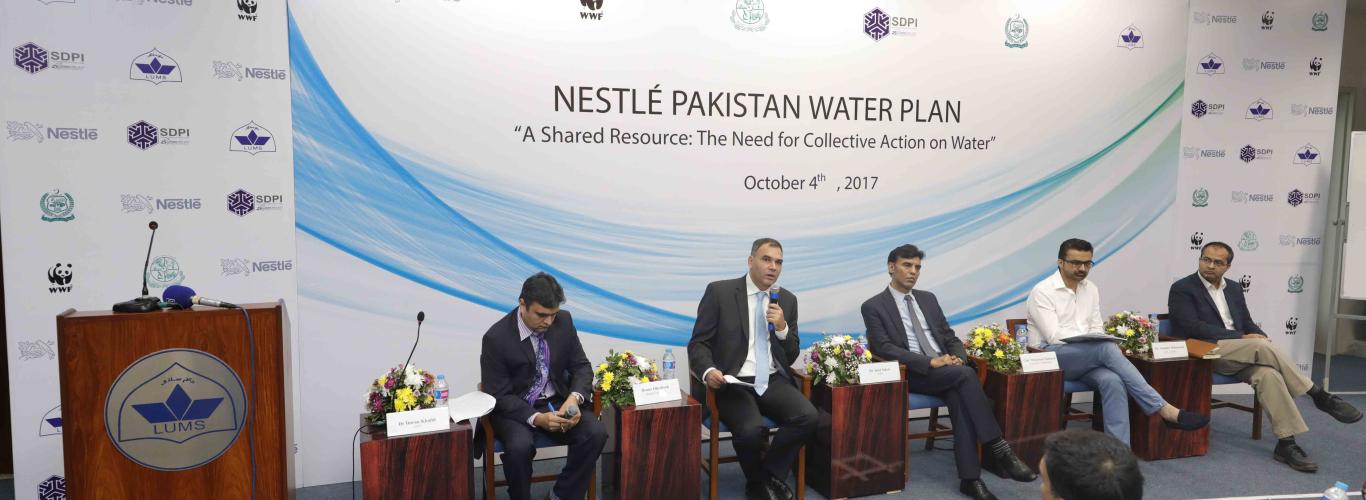LUMS Hosts the Launch of Nestlé Pakistan Water Plan
In a rare alliance across the corporate sector, academia, think tanks, the development sector and the government of Pakistan, the Nestlé Pakistan Water Plan was unveiled at LUMS on Wednesday, October 4, 2017. The coalition was led by Nestlé Pakistan with Lahore University of Management Sciences (LUMS), Sustainable Development Policy Institute (SDPI), WWF Pakistan (World Wildlife Fund), Department of Agriculture, Government of Punjab and the Pakistan Agriculture Research Centre (PARC).
Today, one of the major threats faced by Pakistan is water scarcity. It is the third most water stressed country in the world, with the current per capita annual water availability of 1,017 cubic meters (down from 1,500 cubic meters in 2009). There are scientific guesstimates that the country may run dry by 2025, if immediate, collective action is not taken.
The Nestlé Pakistan Water Plan aims to bring together multiple partners to preserve and protect water resources by leveraging research and technology to reduce and recycle water, introduce sustainable agricultural techniques to reduce water use vis-a-vis increased yield and provide access to clean and safe water within communities.
Prof. Dr. S. Sohail H. Naqvi, Vice Chancellor LUMS reiterated the stance, commenting, “LUMS is proud to play a role in addressing the water scarcity issue as it is imperative that we come together to resolve this for our present and future generations”.
At the occasion, Bruno Olierhoek, Managing Director, Nestlé Pakistan declared Nestlé Pakistan’s commitments to the water cause in the coming years. He said, “Our Shiekhupura Factory was Alliance for Water Stewardship (AWS) certified in 2017 and we aim to get the remaining three factories certified by AWS standards by the end of 2019. We will increase the number of drinking water facilities to seven in 2018 with a new installation in Kabirwala. Furthermore, we want to promote drip irrigation amongst other water efficient initiatives. By the end of 2017, drip irrigation will be implemented on 68 acres of land leading to a water saving of 147 mio litres which will be further extended to 185 acres resulting in savings of over 400 mio litres by the end of 2019.”
Dr. Abubakr Muhammad, Director, Centre for Water Informatics and Technology (WIT), highlighted the role of technology in the management of water in agriculture, industry and domestic usage by commenting, "Many low-cost and scalable solutions can be envisioned that can leverage the enormous success of ICT driven technologies in other sectors. For example, WIT researchers have worked with farmers to detect over-irrigation or water-stress for their crops using extremely low-cost indigenously-developed electronic sensors. Nestle agronomists have convinced us that the business case for deploying such soil moisture sensors at large scales in farms all over Pakistan is very strong," said Dr. Abubakr.
Meanwhile, WIT researchers have also looked at Nestle's dairy field operations and helped instrument the energy, water and wastage at unprecedented scales using IoT enabled devices. "This is invaluable information, not just for Nestle but to project for the energy and water footprint of the entire dairy sector in the province. In addition to economic planning, this data can be useful in climate-related studies and identify basin-scale trends," he added.





